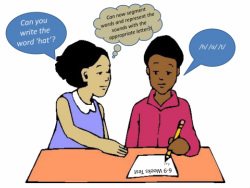
Ever looked back at an old picture of you or one of your kids and been amazed at the changes that have taken place since it was taken? Kids grow and change right before our eyes, but we often find it hard to notice these subtle changes without some sort of evidence. Years later, however, when a photograph or video emerges, the changes become obvious.
So it goes with our kids' school skills and mental abilities. If all goes well, our kids' brains should be constantly evolving, growing, and making new connections. If they aren't, we must notice and correct whatever is going wrong as soon as possible. Unlike not noticing your child's physical development, letting precious time slip by without noticing and/or acting on a lack of brain development can cause real harm. After all, the further a child falls behind, the harder it is to catch him or her back up.
To keep track of what your kids know and/or don't know, you need to constantly test them. Sometimes, this can be done informally by simply calling on your kids to answer a variety of relevant and telling questions while making a mental note of who knows what. Having your students complete written assignments on their own can also help give you a quick, informal peek at how they are progressing. Other times, however, you will need to test your kids more formally, calling them up one-on-one to answer a specific set of questions geared to expose any hidden weaknesses and/or problems that might exist.
So it goes with our kids' school skills and mental abilities. If all goes well, our kids' brains should be constantly evolving, growing, and making new connections. If they aren't, we must notice and correct whatever is going wrong as soon as possible. Unlike not noticing your child's physical development, letting precious time slip by without noticing and/or acting on a lack of brain development can cause real harm. After all, the further a child falls behind, the harder it is to catch him or her back up.
To keep track of what your kids know and/or don't know, you need to constantly test them. Sometimes, this can be done informally by simply calling on your kids to answer a variety of relevant and telling questions while making a mental note of who knows what. Having your students complete written assignments on their own can also help give you a quick, informal peek at how they are progressing. Other times, however, you will need to test your kids more formally, calling them up one-on-one to answer a specific set of questions geared to expose any hidden weaknesses and/or problems that might exist.

 RSS Feed
RSS Feed
